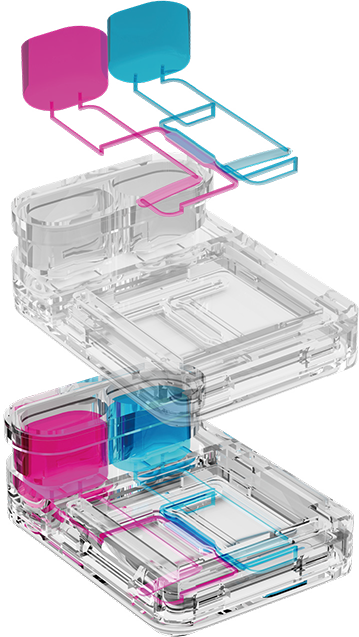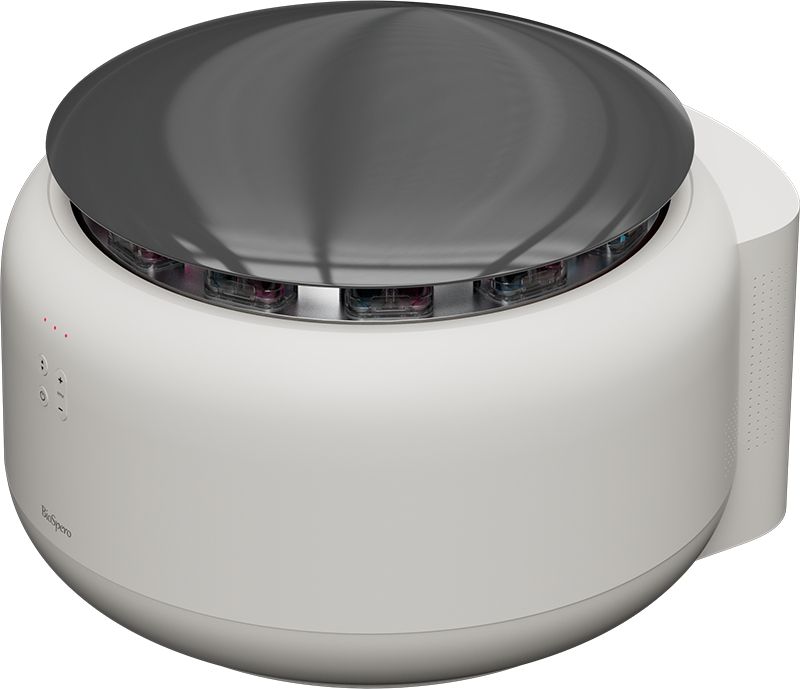Technology
How OrganXpert Sets a New Standard :
Distinct Advantages Over Conventional Microphysiological Systems
OrganXpert stands out in the landscape of organ-on-a-chip and microphysiological systems by combining advanced engineering with user-centric design to deliver unmatched research performance. Here’s what sets OrganXpert apart from other devices:

6 Key Features
1. True-to-Life Human Microenvironment Simulation
OrganXpert precisely replicates the complex 3D architecture and dynamic perfusion found in human organs, enabling more physiologically relevant experiments than conventional static or 2D systems. This leads to more predictive drug efficacy and toxicity results, bridging the gap between preclinical studies and real-world patient outcomes 12.
2. Pump-Free, Tubing-Free Circulation
Unlike most organ-on-a-chip platforms that require external pumps and tubing-raising contamination risks and complicating maintenance-OrganXpert features an integrated, pump-free circulation system. This innovation minimizes contamination, reduces operational complexity, and ensures consistent, reliable results.
3. High-Throughput, Multi-Model Capability
With the ability to run up to 12 chips simultaneously, OrganXpert enables large-scale, parallel experiments. This dramatically increases data output and accelerates discovery, making it ideal for drug screening, toxicity testing, and disease modeling at scale.
4. Intuitive, User-Friendly Design
OrganXpert’s cartridge-based chip system and automated lifting mechanism allow for easy installation, removal, and cleaning, minimizing downtime and user error. This design ensures that even complex multi-organ experiments are accessible and reproducible.
5. Broad Applicability and Cost Efficiency
From drug development and precision medicine to cosmetics, chemicals, and environmental testing, OrganXpert’s versatility outpaces traditional systems. Its streamlined workflow and reduced maintenance translate into significant cost and time savings for research and industry partners.
6. Superior Data Reliability and Reproducibility
By minimizing contamination risks and standardizing experimental conditions, OrganXpert delivers highly reproducible, high-quality data-essential for regulatory submissions and translational research.
Experience the next generation of organ-on-a-chip technology with OrganXpert-where precision, scalability, and user-focused engineering converge to empower groundbreaking biomedical innovation.
OrganXpert’s 3D :
OrganXpert’s 3D co-culture and blood flow simulation technologies recreate the true human microenvironment-delivering unparalleled accuracy and reliability in drug response and toxicity testing.
Experience the next level of physiological relevance in biomedical research.
OrganXpert’s 3D co-culture system enables the simultaneous cultivation of multiple cell types (e.g., cancer, stromal, immune cells) in a three-dimensional structure, closely mimicking the in vivo human tissue microenvironment. Cells are organized in either scaffold-based or scaffold-free spheroids/organoids, allowing for natural cell-cell interactions and signaling. For example, co-culturing tumor and immune cells at a physiological 1:1 ratio forms spheroids that replicate the tumor microenvironment and immune response, enabling accurate assessment of drug efficacy and cellular behavior.
Blood flow simulation is realized through OrganXpert’s pump-free, tubing-free microfluidic channels, which continuously circulate culture medium (supplying nutrients, drugs, and oxygen) inside the chip. These microchannels are engineered to mimic vascular structures, delivering a controlled flow rate (e.g., 20–125 μL/min) and shear stress to the cultured cells. This dynamic perfusion ensures that cells experience physiologically relevant mechanical and biochemical cues, closely replicating in vivo blood flow conditions for precise modeling of drug absorption, metabolism, and toxicity.
Together, OrganXpert’s 3D co-culture and blood flow simulation technologies provide:
- Enhanced cell-cell interaction
- Stable long-term culture
- Superior accuracy in drug response and toxicity prediction compared to conventional 2D or static systems.

